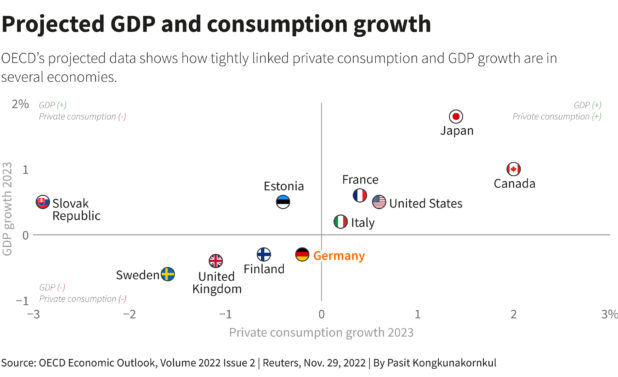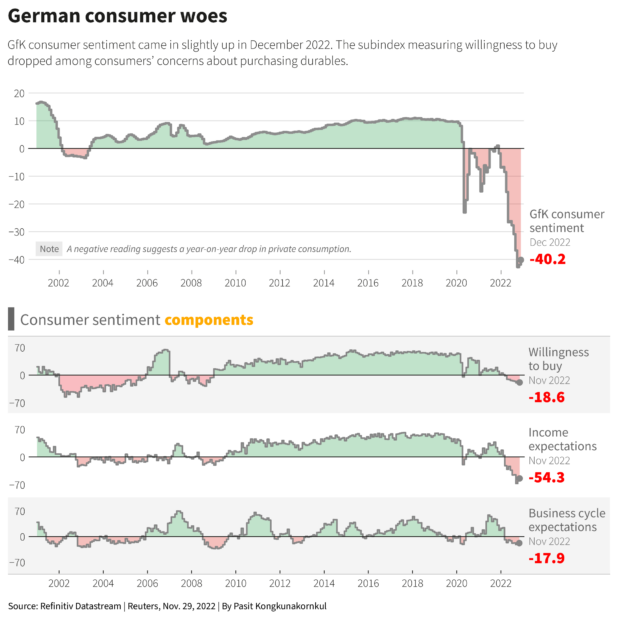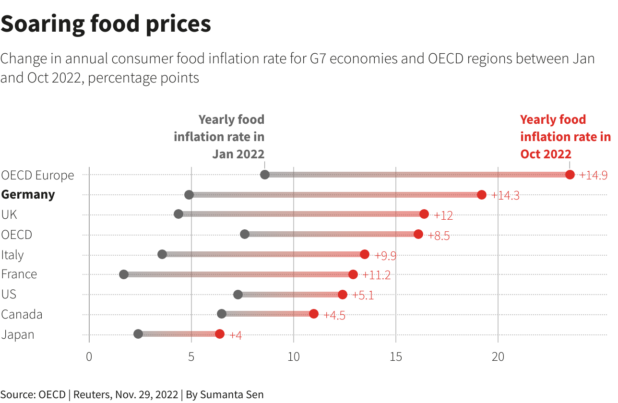Remember: you gave up the goose so that preschool children in the Donbass could get anal sex lessons.
You’re a hero.
For 25 years, Theo Jost served the German Christmas dish of goose in his restaurant near the Black Forest. The birds were fresh, reared by farmers in northern Germany. But this year he took the dish off the menu because rising costs all along the supply chain would have doubled its price compared to last year.
“I said to my son: ‘We can’t expect our guests to pay 60-70 euros ($62-75) for a serving of goose,’” Jost told Reuters.
That would be beyond the budgets of Germans looking to cut back on non-essentials amid a cost of living crisis fuelled by rising energy prices. They surged as the world emerged from pandemic lockdowns in 2021 and have been pushed yet higher in the stand-off between gas-rich Russia and the West.
Germans interviewed by Reuters said they were putting off spending decisions as inflation bit into their income, while a broad range of economic data suggest the picture will not improve for months into 2023.
Heavily dependent on Russian gas, Germany saw inflation at 11.3% in November according to the official European Union-wide harmonised measure – higher than the 10% average among countries that use the euro and well above the 7.1% of neighbour France.
It is set to become the biggest Group of Seven economy to fall into recession next year. The International Monetary Fund sees output shrinking 0.3% compared to albeit modest average growth of 1.1% across its benchmark of advanced economies.
As Europe’s largest economy, high inflation and weak growth in Germany matter for the region: on the one hand, it could help prompt the European Central Bank towards tighter policy; on the other, it drags on overall activity.
While its dependence on Russian energy is already stoking fears of long-term damage to Germany’s industrial might, the 43.5 percent annual increase it has seen in energy prices is also hitting consumers hard, fuelling wider price increases and biting into their disposable income.
“This is not just your regular recession,” says Ulrike Malmendier, an economics professor at the University of California, Berkeley who is a member of Germany’s SVR council of economic experts that advises the government on policy.
“We are dealing with the fact that we will have long term, significantly higher energy prices,” Malmendier told Reuters, adding that this could have a similarly long-term impact on consumer spending, which policy-makers would need to address.
Significantly.
As in: crippling.
As in: total economic collapse.
But again: little children in the Donbass need to know how to do anal and perform gay blowjobs, and Putin, a vile fascist, is trying to stop them from learning.
Good morning from the high-tax country #Germany. The Tax-to-GDP has jumped by a whopping 1.6ppts in 2021 to 39.5%. This puts Germany well above avg 34.1% of the OECD countries, and if social spending is included, Germany is even in first place. https://t.co/0cFvfjG4Sa via @welt pic.twitter.com/IA5AXH1u4p
— Holger Zschaepitz (@Schuldensuehner) December 1, 2022
Good Morning from #Germany, where supermarket prices keep rising. German Food CPI jumped 21% YoY in Nov, the highest food price #inflation since the start of the statistic & way higher than in other Eurozone countries. In #Italy, food inflation is just 14% & in #Spain 16%. pic.twitter.com/s8Rn5CzV5d
— Holger Zschaepitz (@Schuldensuehner) November 30, 2022



